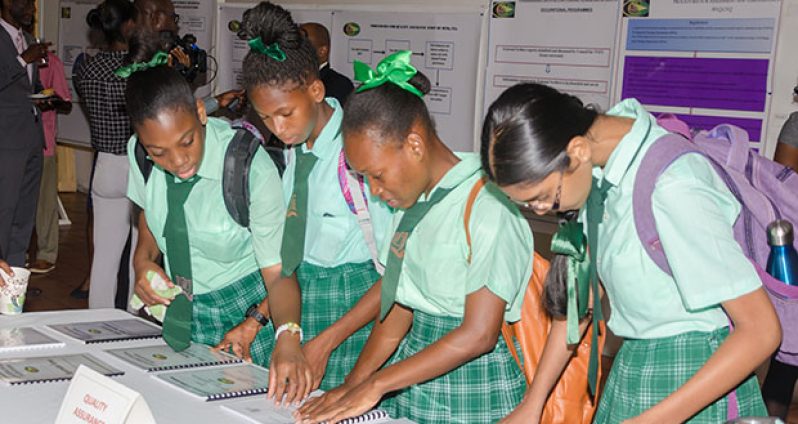-with Guyana now authorised to grant Caribbean Vocational Qualifications
By Ravin Singh
CARPENTERS, masons and others with certification from the country’s technical institutes could soon be able to travel and work hassle-free in the Caribbean. This comes with an announcement Wednesday that Guyana has been authorised to grant Caribbean Vocational Qualifications (CVQs) certificates for the so-called technical and vocational subjects.

To qualify, a person would have to complete a competency-based programme in a technical area, according to a set of regionally agreed standards for levels of learning and skills.
“The implication of this development has far-reaching effects for CARICOM,” said Dr Rupert Roopnaraine, Minister of Education, at an event at the Pegasus Hotel in Georgetown where the announcement was made.
“The movement of skills will be easily facilitated and accomplished, since all of the countries will be operating within one human resource development education system.
“It will also provide one trajectory for the engagement of the rest of the world with regard to the movement of skills beyond the region,” Dr Roopnaraine state.
In early March this year, the Council for Human and Social Development (COHSOD) of the Caribbean Community gave authorisation to Guyana and St Vincent and the Grenadines to award the CQV, based on the recommendation of the Caribbean Association of National Training Agencies (CANTA).
The decision by COHSOD allowed the two countries to join five others, Jamaica, Trinidad and Tobago, Barbados, St Lucia and Grenada in awarding a regional qualification – the CVQ – to persons who have satisfied the stringent technical and other competency requirements associated with specific occupations.
As such, the qualifications, once successfully achieved, will equip Guyanese and other nationals whose country subscribe to CVQs, to have access to jobs in the related fields within the region.
Emphasising the significance and importance of Technical and Vocational Education and Training (TVET) to the Caribbean, Minister Roopnaraine said that TVET is a key element in preparing a country’s manpower for development.
He noted that the establishment of technical and vocational skills training standards across the Caribbean region will go a far way towards integration and development of the region’s workforce.
The Education Minister went on to highlight the work of the regional education institutions in the effort to standardise training and certification across the region.
He explained that in this process, the CXC has played a lead role with the complete harmonisation of secondary education.
Additionally, he noted that it also presents a challenge for the governments of the Caribbean to give effect to the establishment of the council for tertiary education, thus completing the tripod on which a harmonised and integrated education system is being built.
“This is indeed what CARICOM is all about, as I understand it, and underlines the onerous responsibility which is placed on our human development system, the education system. It is ironic that all of this is occurring when CARICOM is actively addressing the question of a regional human resource policy; what is happening today can only be defined as timely,” the minister said.
Minister Roopnaraine also seized the opportunity to encourage technical and vocational educators to not become complacent in their achievement of regional accreditation, but to work steadfastly at encouraging citizens to pursue this much needed line of education.
“CTVET [Guyana] is therefore challenged to embrace its additional function of promoting and propagating technical and vocational education, and pushing back the stigma that has negatively impacted entry into the technical and vocational fields, thus depriving those jobs of the quantum and quality of manpower required,” he said.

Speaking at the launch too was Registrar of the Caribbean Examinations Council (CXC), Glenroy Cumberbatch, who underscored the need for education and training to be aligned with the needs of the Caribbean.
“…we have several people across the region at the secondary level who cannot find employment and worst, who [have] finished their education at the university level and have degrees in medicine, [and] in law and still can’t find employment. There is a mismatch between what we are doing and what is needed,” he said.
As such, Cumberbatch explained that it becomes imperative for persons to follow the CVQ programme, so that the skills they leave school with are more work-related as opposed to solely academic.
“…intelligence must not be seen as people with first-class honours only, but the ordinary people who contribute to the economy must be seen as intelligent also,” the Registrar said, adding that too many people leave school unable to communicate – one of the four Cs necessary for human development.
The second C, he said, is creativity. According to Cumberbatch, learning something and regurgitating it is not an example of an intelligent person. As such, he believes that intelligence must now be redefined.
“Sometimes we believe if I learn something by heart and give it back is intelligence, but how can I take something and transform it into something else, something that is better for me, my family and my country? How can I do that kind of engineering?” he rhetorically questioned.
The Registrar also mentioned critical thinking, which he said can be achieved in many ways. He said that one of the easiest is making good decisions from the information that one has.
“If we can think critically we can do a wonderful job in managing ourselves, becoming self-regulatory and also providing for our families and so on…”
The final component, he alluded to, is collaboration. According to Cumberbatch, there are scenarios where persons hide their work from others, and this he said, could limit the true collective potential of a group.
He pointed to the fact that labs across the world share information on their findings in their pursuit to find a cure for cancer. As such, he noted that collaboration facilitates the sharing of information which helps to bring about a conclusion much quicker.



.jpg)










